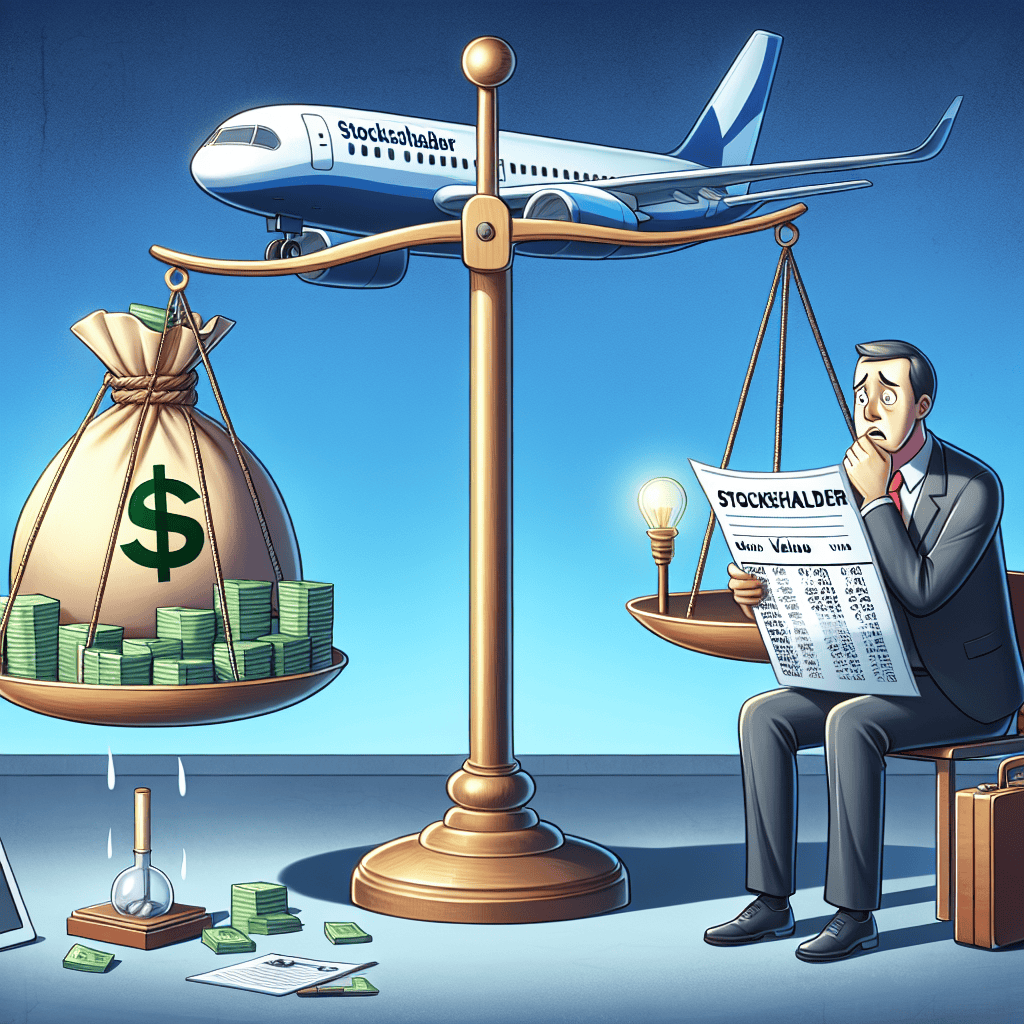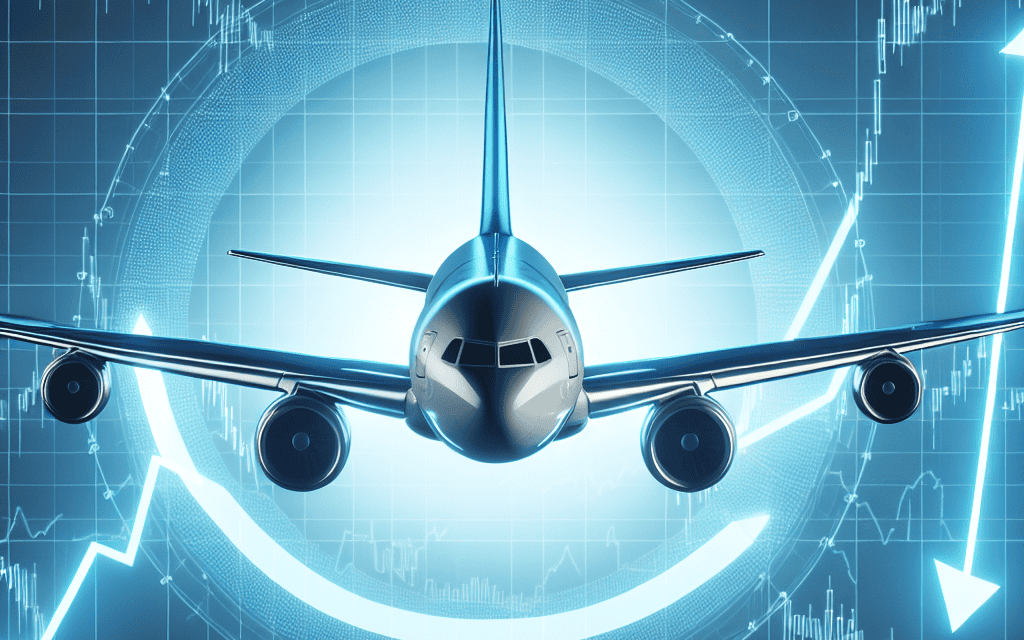“United Airlines’ Buyback: Boosting Shares or Shortchanging Value?”
Introduction
United Airlines’ recent announcement of its share buyback program has sparked a debate among investors and financial analysts regarding its potential impact on stockholder value. While share buybacks are often employed by companies as a strategy to return capital to shareholders and signal confidence in future earnings, concerns have emerged about whether this move truly aligns with the long-term interests of United Airlines’ stockholders. Critics argue that the allocation of substantial resources towards repurchasing shares could detract from necessary investments in operational improvements, fleet modernization, and customer service enhancements, which are crucial for sustaining competitive advantage in the volatile airline industry. As stakeholders scrutinize the implications of this financial maneuver, the broader conversation centers on balancing immediate shareholder returns with sustainable growth and value creation.
Impact Of United Airlines’ Share Buyback On Long-Term Stockholder Value
United Airlines’ recent announcement of a share buyback program has sparked a debate among investors and financial analysts regarding its potential impact on long-term stockholder value. Share buybacks, a strategy where a company repurchases its own shares from the marketplace, are often employed to return capital to shareholders, potentially boosting the stock price by reducing the number of shares outstanding. However, the implications of such a move on long-term stockholder value are multifaceted and warrant a closer examination.
To begin with, proponents of share buybacks argue that they can signal management’s confidence in the company’s future prospects. By investing in its own shares, United Airlines may be indicating that it believes the stock is undervalued and that the company is poised for growth. This perception can lead to increased investor confidence, potentially driving up the stock price in the short term. Furthermore, buybacks can improve financial metrics such as earnings per share (EPS), as the reduction in outstanding shares can lead to higher EPS figures, making the company appear more profitable.
Nevertheless, critics of share buybacks caution that the practice can sometimes prioritize short-term gains over long-term strategic investments. By allocating significant capital to repurchase shares, United Airlines may be diverting funds away from other critical areas such as fleet modernization, technological advancements, or expanding its route network. These investments are essential for maintaining competitive advantage and ensuring sustainable growth in the highly competitive airline industry. Consequently, the opportunity cost of buybacks could potentially undermine the company’s ability to generate long-term value for its shareholders.
Moreover, the timing of share buybacks is crucial. If United Airlines repurchases shares when the stock is overvalued, it could lead to inefficient capital allocation, ultimately eroding shareholder value. This risk is particularly pertinent in volatile markets where stock prices can fluctuate significantly. Therefore, the decision to initiate a buyback program should be carefully evaluated against the backdrop of market conditions and the company’s intrinsic value.
In addition to these considerations, the impact of share buybacks on stockholder value is also influenced by the broader economic environment. In periods of economic uncertainty or downturns, companies with strong cash reserves and prudent financial management are better positioned to weather challenges. By utilizing cash for buybacks, United Airlines may be reducing its financial flexibility, potentially limiting its ability to respond to unforeseen economic disruptions or capitalize on strategic opportunities.
Furthermore, the perception of share buybacks has evolved in recent years, with increasing scrutiny from regulators and stakeholders. Critics argue that buybacks can exacerbate income inequality by disproportionately benefiting executives and large shareholders, who may receive substantial compensation linked to stock performance. This growing concern has led to calls for greater transparency and accountability in corporate governance practices, urging companies like United Airlines to balance shareholder returns with broader stakeholder interests.
In conclusion, while United Airlines’ share buyback program may offer potential benefits such as increased investor confidence and improved financial metrics, it also raises important questions about the company’s long-term strategic priorities and financial resilience. As the airline industry continues to navigate a complex and dynamic landscape, the challenge for United Airlines will be to strike a balance between returning capital to shareholders and investing in sustainable growth initiatives that enhance long-term stockholder value.
Analyzing The Financial Implications Of United Airlines’ Buyback Strategy
United Airlines’ recent announcement of a share buyback program has sparked a significant debate among investors and financial analysts regarding its potential impact on stockholder value. As the airline industry continues to recover from the unprecedented challenges posed by the COVID-19 pandemic, United Airlines’ decision to repurchase its own shares is seen by some as a strategic move to bolster investor confidence. However, others express concerns about the long-term implications of this strategy, particularly in terms of financial stability and sustainable growth.
To begin with, share buybacks are often employed by companies as a means to return capital to shareholders, effectively reducing the number of outstanding shares and potentially increasing the value of remaining shares. In theory, this can lead to a higher earnings per share (EPS) ratio, which may attract more investors and drive up the stock price. For United Airlines, the buyback program could be perceived as a signal of confidence in its financial health and future prospects, especially as the airline industry shows signs of recovery. By repurchasing shares, United Airlines might aim to project an image of strength and stability, reassuring investors of its commitment to enhancing shareholder value.
Nevertheless, it is crucial to consider the broader financial implications of such a strategy. Critics argue that share buybacks can sometimes prioritize short-term stock price gains over long-term investments in the company’s growth and operational efficiency. In the case of United Airlines, allocating substantial resources to repurchase shares could potentially divert funds away from critical areas such as fleet modernization, technological advancements, and customer service improvements. These investments are essential for maintaining a competitive edge in an industry characterized by rapid technological changes and evolving consumer preferences.
Moreover, the timing of the buyback program raises questions about the airline’s financial priorities. With the airline industry still grappling with fluctuating demand and rising operational costs, some analysts suggest that United Airlines should focus on strengthening its balance sheet and building financial resilience. The decision to initiate a buyback program at this juncture might be perceived as premature, especially if the company has not yet fully addressed the financial setbacks incurred during the pandemic.
Furthermore, the impact of share buybacks on stockholder value is not always straightforward. While reducing the number of outstanding shares can lead to a higher EPS, it does not necessarily translate into increased intrinsic value for the company. Investors may question whether the buyback program is genuinely enhancing the company’s long-term value or merely providing a temporary boost to the stock price. This skepticism is particularly relevant in an industry where external factors such as fuel prices, regulatory changes, and geopolitical tensions can significantly influence financial performance.
In conclusion, United Airlines’ share buyback program presents a complex scenario for stakeholders to consider. While it may offer immediate benefits in terms of stock price appreciation and investor sentiment, the long-term implications for financial stability and sustainable growth remain uncertain. As the airline navigates the post-pandemic landscape, it is imperative for United Airlines to strike a balance between returning capital to shareholders and investing in strategic initiatives that ensure its competitiveness and resilience in the years to come. Ultimately, the success of the buyback program will depend on the company’s ability to align its financial strategies with its overarching goals for growth and value creation.
Share Buybacks Vs. Dividends: What United Airlines’ Decision Means For Investors
United Airlines’ recent decision to initiate a share buyback program has sparked a debate among investors and financial analysts regarding the implications for stockholder value. This move, while not uncommon among large corporations, raises questions about the long-term benefits for shareholders compared to alternative strategies such as dividend payouts. As companies often face the dilemma of choosing between share buybacks and dividends, understanding the nuances of each approach is crucial for investors seeking to maximize their returns.
Share buybacks, or repurchase programs, involve a company buying back its own shares from the marketplace. This action reduces the number of outstanding shares, potentially increasing the value of remaining shares and improving financial metrics such as earnings per share (EPS). United Airlines’ decision to pursue this strategy suggests a confidence in its financial health and future prospects, as companies typically engage in buybacks when they believe their stock is undervalued. However, this approach is not without its critics. Some argue that buybacks can be a short-term tactic to boost stock prices, benefiting executives with stock-based compensation rather than delivering sustainable value to long-term shareholders.
In contrast, dividends provide a direct return of profits to shareholders, offering a tangible benefit that can be particularly appealing to income-focused investors. Dividends can signal a company’s stability and commitment to sharing its success with investors, fostering trust and loyalty. However, they also represent a cash outflow that could otherwise be reinvested into the business for growth opportunities. This trade-off between immediate returns and potential future gains is at the heart of the debate over the best use of corporate profits.
United Airlines’ choice to prioritize share buybacks over dividends may reflect its strategic priorities and market conditions. For instance, the airline industry is capital-intensive, requiring significant investment in fleet maintenance and expansion. By opting for buybacks, United Airlines might be aiming to maintain financial flexibility while still rewarding shareholders. Additionally, the current economic environment, characterized by fluctuating interest rates and market volatility, could influence the company’s decision to favor buybacks as a means of stabilizing its stock price.
Nevertheless, the effectiveness of share buybacks in enhancing stockholder value is contingent upon several factors. Timing is crucial; repurchasing shares when prices are high can negate the intended benefits. Moreover, the perception of buybacks as a signal of limited growth opportunities can deter investors seeking companies with robust expansion plans. Therefore, United Airlines must carefully balance its buyback strategy with transparent communication about its long-term vision and growth initiatives.
In conclusion, United Airlines’ share buyback program underscores the ongoing debate between buybacks and dividends as mechanisms for returning value to shareholders. While buybacks can offer immediate financial benefits and reflect management’s confidence, they also carry risks and potential downsides. Investors must weigh these considerations against their own financial goals and risk tolerance. As United Airlines navigates this complex landscape, its ability to effectively execute its buyback strategy and articulate its broader strategic objectives will be pivotal in determining the ultimate impact on stockholder value.
United Airlines’ Buyback Program: A Short-Term Boost Or Long-Term Risk?

United Airlines’ recent announcement of a share buyback program has sparked a debate among investors and financial analysts regarding its potential impact on stockholder value. The airline industry, known for its cyclical nature and susceptibility to economic fluctuations, has seen companies like United Airlines adopt various strategies to enhance shareholder returns. However, the decision to repurchase shares raises questions about whether it serves as a short-term boost or poses a long-term risk to the company’s financial health and stockholder value.
To begin with, share buyback programs are often employed by companies to return capital to shareholders, reduce the number of outstanding shares, and potentially increase earnings per share (EPS). By repurchasing its own shares, United Airlines aims to signal confidence in its financial stability and future prospects. This move can lead to a temporary increase in stock prices, as reduced supply of shares can drive up demand. Consequently, shareholders may experience an immediate uplift in the value of their investments, which can be particularly appealing in a volatile market environment.
Nevertheless, it is crucial to consider the broader implications of such a strategy. Critics argue that share buybacks can divert funds away from more productive uses, such as investing in new technologies, expanding operations, or improving customer service. In the case of United Airlines, the airline industry is facing significant challenges, including rising fuel costs, increased competition, and evolving consumer preferences. Allocating substantial resources to buybacks might limit the company’s ability to address these issues effectively and sustain long-term growth.
Moreover, the timing of the buyback program is a critical factor to consider. If United Airlines is repurchasing shares at a time when its stock is overvalued, it could lead to inefficient capital allocation. This scenario might result in a diminished return on investment for shareholders in the long run. Additionally, the use of debt to finance buybacks can increase the company’s leverage, potentially exposing it to greater financial risk, especially during economic downturns or industry-specific challenges.
Furthermore, the impact of share buybacks on stockholder value is not solely determined by financial metrics. The perception of stakeholders, including employees, customers, and regulators, plays a significant role in shaping the company’s reputation and long-term success. A focus on buybacks might be perceived as prioritizing short-term gains over sustainable business practices, which could lead to reputational damage and erode stakeholder trust.
In light of these considerations, it is essential for United Airlines to strike a balance between returning capital to shareholders and investing in its core business operations. Transparent communication with investors about the rationale behind the buyback program and its alignment with the company’s strategic goals can help mitigate concerns and foster confidence in its long-term vision. Additionally, exploring alternative methods of enhancing shareholder value, such as dividend payments or strategic partnerships, could provide a more diversified approach to capital allocation.
In conclusion, while United Airlines’ share buyback program may offer a short-term boost to stockholder value, it is imperative to carefully assess the potential long-term risks associated with this strategy. By weighing the benefits against the drawbacks and considering the broader context of the airline industry, United Airlines can make informed decisions that align with its commitment to sustainable growth and shareholder value creation.
How United Airlines’ Share Buyback Affects Market Perception And Stock Prices
United Airlines’ recent announcement of a share buyback program has sparked a significant debate among investors and market analysts regarding its potential impact on stockholder value and market perception. Share buybacks, a strategy where a company repurchases its own shares from the marketplace, are often employed to return capital to shareholders, potentially boosting the stock price by reducing the number of shares outstanding. However, the implications of such a move are multifaceted and warrant a closer examination.
To begin with, the primary rationale behind share buybacks is to enhance shareholder value by increasing earnings per share (EPS). By reducing the number of shares in circulation, the company’s earnings are distributed over a smaller base, theoretically leading to a higher EPS. This can make the stock more attractive to investors, potentially driving up the stock price. In the case of United Airlines, the buyback program could signal management’s confidence in the company’s financial health and future prospects, which might positively influence market perception.
Nevertheless, it is crucial to consider the broader context in which this buyback is occurring. The airline industry has been navigating a turbulent period, marked by fluctuating fuel prices, labor disputes, and the lingering effects of the COVID-19 pandemic. In such an environment, the decision to allocate substantial resources to repurchase shares rather than investing in operational improvements or debt reduction could raise eyebrows. Critics argue that this approach might prioritize short-term stock price gains over long-term strategic growth, potentially undermining the company’s resilience in the face of future challenges.
Moreover, the timing of the buyback program is another factor that could affect market perception. If investors perceive the buyback as an attempt to artificially inflate the stock price during a period of underperformance, it could lead to skepticism about the company’s underlying fundamentals. This skepticism might be exacerbated if the buyback is funded through increased debt, which could strain the company’s balance sheet and limit its financial flexibility.
On the other hand, proponents of the buyback program might argue that it reflects a disciplined capital allocation strategy. By returning excess cash to shareholders, United Airlines could be demonstrating a commitment to maximizing shareholder returns, especially if the company believes its stock is undervalued. This perspective suggests that the buyback could be a prudent move, provided it is executed without compromising the company’s financial stability.
Furthermore, the impact of the buyback on stock prices is not guaranteed. While buybacks can lead to a temporary boost in stock prices, the long-term effect depends on various factors, including the company’s overall performance and market conditions. Investors will likely scrutinize United Airlines’ subsequent financial results and strategic initiatives to assess whether the buyback has indeed created sustainable value.
In conclusion, United Airlines’ share buyback program presents a complex interplay of factors that could influence market perception and stock prices. While the initiative might signal confidence and potentially enhance shareholder value, it also raises concerns about the company’s strategic priorities and financial health. As the situation unfolds, investors and analysts will be closely monitoring the company’s performance and market reactions to determine the true impact of the buyback on stockholder value. Ultimately, the success of this program will hinge on United Airlines’ ability to balance short-term gains with long-term growth and stability.
Evaluating The Pros And Cons Of United Airlines’ Share Buyback Initiative
United Airlines’ recent announcement of a share buyback program has sparked a lively debate among investors and financial analysts, raising questions about the long-term implications for stockholder value. Share buybacks, a strategy where a company repurchases its own shares from the marketplace, are often employed to return capital to shareholders, potentially boosting the stock price by reducing the number of shares outstanding. However, while this approach can offer immediate financial benefits, it also presents several challenges and risks that warrant careful consideration.
To begin with, proponents of the buyback initiative argue that it signals confidence in the company’s financial health and future prospects. By repurchasing shares, United Airlines is effectively communicating to the market that it believes its stock is undervalued, thus making it a prudent investment. This can lead to a positive perception among investors, potentially driving up the stock price. Furthermore, buybacks can enhance earnings per share (EPS) by reducing the number of shares in circulation, thereby making the company appear more profitable on a per-share basis. This can be particularly appealing to investors who prioritize short-term gains and immediate returns.
Nevertheless, it is crucial to examine the potential downsides of such a strategy. Critics argue that share buybacks can divert funds away from other critical areas of investment, such as research and development, infrastructure improvements, or debt reduction. In the case of United Airlines, which operates in a highly competitive and capital-intensive industry, the allocation of resources towards buybacks rather than operational enhancements could hinder its ability to maintain a competitive edge. Moreover, relying heavily on buybacks to boost stock prices may create an artificial sense of financial stability, masking underlying issues that could resurface in the future.
Additionally, the timing of buybacks is a critical factor that can influence their effectiveness. If United Airlines repurchases shares when the stock is overvalued, it risks overpaying, which could ultimately erode shareholder value. This concern is particularly relevant in volatile market conditions, where stock prices can fluctuate significantly. Therefore, the decision to initiate a buyback program should be based on a thorough analysis of market conditions and the company’s intrinsic value, rather than as a reactionary measure to appease shareholders.
Furthermore, the broader economic context cannot be ignored. With increasing scrutiny on corporate governance and the role of businesses in society, there is growing pressure on companies to demonstrate responsible financial practices. Critics of share buybacks argue that they can exacerbate income inequality by disproportionately benefiting wealthy shareholders and executives, who often hold significant stock options. This raises ethical considerations about the role of corporations in contributing to broader societal goals, beyond merely maximizing shareholder returns.
In conclusion, while United Airlines’ share buyback program may offer certain advantages, such as signaling confidence and potentially boosting stock prices, it also presents several risks and challenges that must be carefully weighed. The decision to pursue buybacks should be made with a comprehensive understanding of the company’s financial position, market conditions, and long-term strategic goals. Ultimately, the effectiveness of this initiative in enhancing stockholder value will depend on its execution and alignment with the company’s broader objectives. As such, stakeholders should remain vigilant and critically assess the implications of this strategy in the context of United Airlines’ overall performance and industry dynamics.
The Role Of Share Buybacks In United Airlines’ Corporate Strategy And Stockholder Relations
United Airlines’ recent announcement of a share buyback program has sparked a debate among investors and analysts regarding its implications for stockholder value. Share buybacks, a common corporate strategy, involve a company purchasing its own shares from the marketplace, thereby reducing the number of outstanding shares. This maneuver can potentially increase the value of remaining shares and is often perceived as a signal of confidence from the company’s management. However, the decision by United Airlines to engage in this practice has raised questions about its long-term impact on stockholder relations and the overall corporate strategy.
To understand the role of share buybacks in United Airlines’ corporate strategy, it is essential to consider the broader context in which these decisions are made. Companies often resort to buybacks when they have excess cash reserves and limited opportunities for profitable reinvestment. By reducing the number of shares in circulation, buybacks can enhance earnings per share (EPS), making the company appear more attractive to investors. In the case of United Airlines, the decision to initiate a buyback program may be interpreted as an effort to bolster its stock price amidst a competitive and volatile airline industry.
Nevertheless, while buybacks can provide short-term boosts to stock prices, they may not always align with the best interests of long-term stockholders. Critics argue that funds allocated for buybacks could be better invested in initiatives that drive sustainable growth, such as fleet modernization, route expansion, or technological advancements. For United Airlines, which operates in an industry heavily impacted by fluctuating fuel prices, regulatory changes, and economic cycles, the allocation of resources towards buybacks rather than strategic investments could pose risks to its future competitiveness.
Moreover, the timing of share buybacks can also influence perceptions of their effectiveness. If executed when stock prices are high, buybacks may not deliver the anticipated value to shareholders. Conversely, purchasing shares when prices are undervalued can be a prudent use of capital. Therefore, the success of United Airlines’ buyback program will largely depend on its ability to time these transactions effectively, a challenge given the inherent unpredictability of the airline sector.
In addition to financial considerations, the decision to pursue share buybacks can impact stockholder relations. While some investors may welcome the immediate financial benefits of buybacks, others may view them as a diversion from addressing fundamental business challenges. For United Airlines, maintaining transparent communication with its stockholders about the rationale behind the buyback program is crucial. By articulating how buybacks fit into the broader corporate strategy, the airline can mitigate potential concerns and foster trust among its investor base.
Furthermore, it is important to recognize that share buybacks are not a one-size-fits-all solution. The effectiveness of such programs varies depending on a company’s unique circumstances and strategic objectives. For United Airlines, the decision to implement a buyback program should be evaluated in conjunction with other strategic initiatives aimed at enhancing operational efficiency, customer satisfaction, and market positioning.
In conclusion, while United Airlines’ share buyback program may offer certain advantages, it also raises important questions about the company’s long-term strategy and stockholder value. As the airline navigates the complexities of the industry, it must carefully balance short-term financial gains with sustainable growth initiatives. By doing so, United Airlines can ensure that its corporate strategy aligns with the evolving expectations of its stockholders, ultimately fostering a more resilient and competitive business.
Q&A
1. **What is a share buyback program?**
A share buyback program is when a company purchases its own shares from the marketplace, reducing the number of outstanding shares.
2. **Why might United Airlines initiate a share buyback program?**
United Airlines might initiate a share buyback program to return value to shareholders, improve financial ratios, or signal confidence in the company’s future prospects.
3. **What concerns might arise from United Airlines’ share buyback program?**
Concerns may include the potential for misallocation of capital, reduced cash reserves, and the possibility that the buyback is being used to artificially inflate stock prices.
4. **How could a share buyback affect stockholder value?**
A share buyback can increase stockholder value by boosting earnings per share (EPS) and potentially increasing the stock price, but it can also raise concerns if it detracts from investments in growth or operational improvements.
5. **What are the potential benefits of United Airlines’ share buyback program?**
Potential benefits include increased EPS, a higher stock price, and a demonstration of confidence in the company’s financial health.
6. **What are the potential drawbacks of United Airlines’ share buyback program?**
Potential drawbacks include reduced cash reserves, less capital for investment in growth opportunities, and the risk of not delivering long-term value to shareholders.
7. **How might investors react to United Airlines’ share buyback program?**
Investors might react positively if they believe the buyback will enhance shareholder value, or negatively if they perceive it as a short-term strategy that could undermine long-term growth.
Conclusion
United Airlines’ share buyback program has raised concerns regarding its impact on stockholder value. While buybacks can signal confidence in the company’s financial health and potentially increase earnings per share by reducing the number of outstanding shares, critics argue that they may not always align with long-term shareholder interests. Concerns include the possibility of buybacks being used to artificially inflate stock prices or diverting funds from essential investments in operations, infrastructure, or debt reduction. Additionally, if executed at inflated stock prices, buybacks can lead to inefficient capital allocation. Therefore, while buybacks can offer short-term benefits, they may not necessarily enhance long-term stockholder value, prompting stakeholders to scrutinize the strategic rationale and timing behind such programs.





